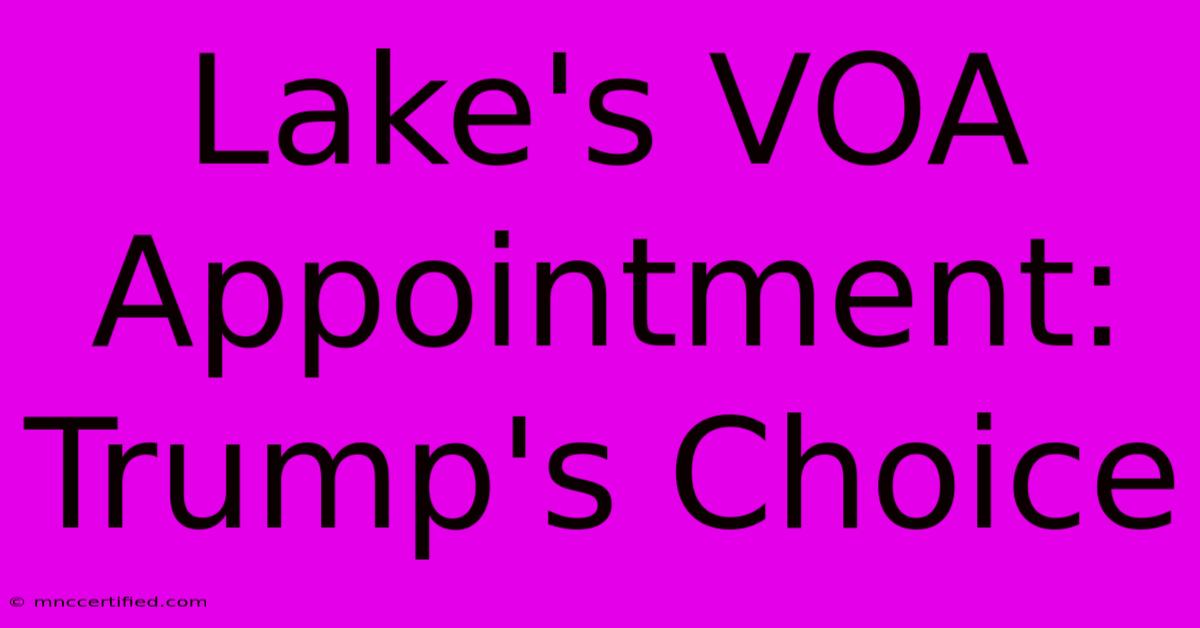Lake's VOA Appointment: Trump's Choice

Table of Contents
Lake's VOA Appointment: Trump's Choice – A Deep Dive into the Controversy
The appointment of Kari Lake to the Voice of America (VOA) board of governors has sparked significant controversy. This article delves into the details surrounding this nomination, examining its implications, the criticisms leveled against it, and the broader context of political appointments within media organizations. We'll explore the key arguments for and against Lake's appointment, offering a balanced perspective on this highly debated topic.
Understanding the Voice of America (VOA)
Before diving into the specifics of Lake's nomination, it's crucial to understand the role and importance of the VOA. The Voice of America is the United States government's international multimedia broadcasting service. Its mission is to provide accurate and objective news and information to audiences worldwide, particularly in countries where independent media is restricted. This mission is paramount to America's soft power and its commitment to global freedom of information. The VOA board of governors oversees the agency's operations and ensures its adherence to its charter.
Kari Lake: A Controversial Figure
Kari Lake, a prominent Republican figure, gained national attention through her unsuccessful gubernatorial campaign in Arizona. Her campaign was marked by staunch support for Donald Trump and her embrace of controversial claims about the 2020 presidential election. These actions have made her a polarizing figure, attracting both ardent supporters and vocal critics. This existing polarization significantly colors the debate surrounding her VOA appointment.
The Appointment and its Rationale
President Trump's nomination of Kari Lake to the VOA board of governors was met with immediate pushback. Supporters argued that Lake's strong conservative views would bring a valuable perspective to the board, ensuring a diversity of opinions in overseeing the agency. They might point to her experience in communications and media as qualifying factors.
However, critics raised concerns that Lake's history of promoting unsubstantiated claims and her openly partisan stance directly contradict the VOA's charter, which mandates impartiality and objectivity. The fear is that her appointment could jeopardize the VOA's reputation for unbiased reporting and potentially compromise its ability to effectively reach international audiences.
Key Criticisms and Concerns
The central criticism surrounding Lake's appointment revolves around her perceived lack of commitment to journalistic integrity and objectivity. Her past statements, especially those regarding the 2020 election, raise serious concerns about her suitability for a role that demands impartial oversight of an international news organization. The potential for political interference in the VOA's editorial independence is a major source of apprehension.
Implications for the VOA's Credibility
A key concern is the potential damage to the VOA's credibility and reputation. If the VOA is perceived as being influenced by partisan politics, its effectiveness in reaching and influencing international audiences will be severely diminished. Trust is the cornerstone of any news organization, and Lake's appointment threatens to erode that trust. This could have significant implications for American diplomacy and its ability to engage with the global community.
The Broader Context: Political Appointments and Media Independence
Lake's appointment fits into a broader pattern of political appointments to media organizations and regulatory bodies. The debate surrounding these appointments often centers on the balance between political representation and the need for independent operation. Maintaining the integrity of vital institutions like the VOA requires careful consideration of these competing factors. The debate highlights the ongoing tension between political influence and the critical need for unbiased information dissemination in the global landscape.
Conclusion: A Critical Examination Needed
The appointment of Kari Lake to the VOA board of governors raises serious questions about the future of this vital international news organization. The debate demands a thorough and objective evaluation, weighing the potential benefits against the significant risks to the VOA's credibility and its commitment to providing unbiased information to a global audience. The long-term consequences of this decision will undoubtedly have a significant impact on America's standing on the world stage and the vital role of independent journalism.

Thank you for visiting our website wich cover about Lake's VOA Appointment: Trump's Choice. We hope the information provided has been useful to you. Feel free to contact us if you have any questions or need further assistance. See you next time and dont miss to bookmark.
Featured Posts
-
Greenlaws Injury 49ers Vs Rams
Dec 13, 2024
-
Ciri Confirmed Witcher 4 Protagonist
Dec 13, 2024
-
Nacua Kupp Change Rams 49ers Game
Dec 13, 2024
-
Morgan Wallen Conditional Plea Deal
Dec 13, 2024
-
Trumps Lake Choice Voa Unease
Dec 13, 2024